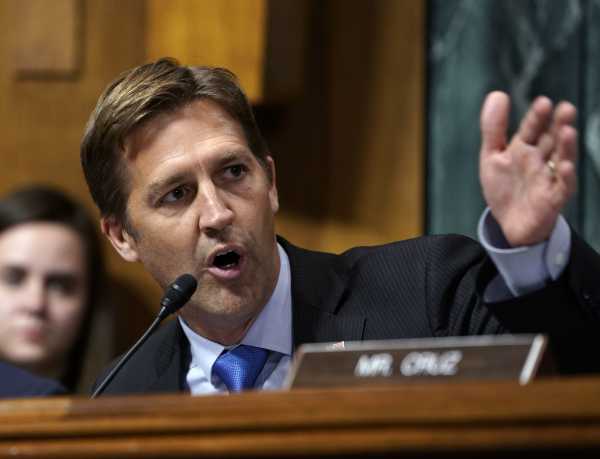
The Senate Judiciary Committee on Tuesday is hearing testimony on a bill that would put in place requirements for the care of infants born after failed abortions — and could send doctors to prison if they fail to comply.
The Born-Alive Abortion Survivors Protection Act, sponsored by Sen. Ben Sasse (R-NE), failed in the Senate last year. But now Sasse is bringing back the legislation, and it’s part of a bigger debate about abortions very late in pregnancy that is intensifying in the runup to the election this year.
Sasse says the legislation is necessary to guarantee the best care for infants. A spokesperson for the senator told Vox in an email, “this is about making sure that every baby receives the same degree of care, whether they’re born in a hospital or an abortion clinic.”
But reproductive rights and physician groups say the bill could criminalize doctors and is unnecessary — not only because a live birth after an abortion attempt is an extremely unlikely scenario but also because laws already exist to protect an infant in this instance anyway. “The bill maligns and vilifies providers and patients to push a false narrative about abortion later in pregnancy,” Dr. Kristyn Brandi, a board member of Physicians for Reproductive Health, told Vox in an email last year.
By holding a hearing on the bill, Sasse is focusing attention on an aspect of the abortion debate that some see as a wedge issue for voters: abortions very late in pregnancy.
The issue came to the fore last year during debate over a Virginia bill that would have broadened the circumstances under which someone could get a third-trimester abortion. Virginia Gov. Ralph Northam made confusing comments in support of the bill that some took as an endorsement of infanticide, and President Donald Trump has been bringing up the episode in speeches ever since. At the March for Life earlier this year, he said that Northam had “stated that he would execute a baby after birth” (the governor did not say this), and that Democrats want to “allow a baby to be ripped from the mother’s womb right up until delivery.”
As before, the Born-Alive Abortion Survivors Protection Act is unlikely to pass, and bringing it up again may be a strategic move by Republicans to energize voters in the runup to this year’s election — using language that, abortion rights advocates say, paints a false picture of abortion in America.
While a majority of Americans believe abortion should be legal under at least some circumstances, some polls have found that abortions in the third trimester are more controversial. For Republicans, bringing up abortions later in pregnancy may be a way to appeal to voters who are on the fence about the issue. And for Trump, talk about “executing babies,” though inaccurate, is likely a way to remind abortion opponents that, regardless of what they may think of him personally, he’s delivered on his promise to appoint anti-abortion judges to courts around the country — and would probably continue to do so if reelected in 2020.
The Born-Alive Abortion Survivors Protection Act is coming up now in part because of controversy over a Virginia abortion bill
The Born-Alive Abortion Survivors Protection Act would require doctors to provide the same care for a baby born alive after a failed attempt at abortion as they would for any child of the same gestational age. After providing appropriate care, they would be required to ensure that the baby “is immediately transported and admitted to a hospital.”
Doctors who failed to comply with the requirements would face a fine and up to five years in prison.
Abortion opponents say the bill is necessary to protect babies, pointing to activists like Gianna Jessen who say they were born after failed abortion attempts. But abortion-rights advocates and some physicians say that today, that situation is so uncommon as to be essentially nonexistent. Brandi, of Physicians for Reproductive Health, said she had never heard of a case of a child born after a failed attempt at an abortion. “This is a part of the false narrative around this bill and abortion later in pregnancy,” she said.
Sasse introduced the bill in 2017, but it did not make it out of committee. Marsha Blackburn, then a House member, sponsored a similar bill in 2017, which passed the House but not the Senate.
When Sasse introduced it again in 2019, all Republicans present voted in favor of a procedural motion on the bill, according to the Washington Post. They were joined by three Democratic senators — Bob Casey (PA), Joe Manchin (WV), and Doug Jones (AL). All other Democrats present voted against the motion, enough to block further consideration of the bill.
In a 2019 speech introducing the bill, Sasse specifically referenced Northam’s comments about the Virginia abortion measure.
Asked about the possibility of abortions during labor, Northam said, “If a mother is in labor, I can tell you exactly what would happen. The infant would be delivered. The infant would be kept comfortable. The infant would be resuscitated if that’s what the mother and the family desired, and then a discussion would ensue between the physicians and the mother.”
A spokesperson for Northam told Vox that the governor was “absolutely not” referring to infanticide, but that “the governor’s comments focused on the tragic and extremely rare case in which a woman with a nonviable pregnancy or severe fetal abnormalities went into labor.”
Related
The controversy around Virginia’s new abortion bill, explained
But Sasse said in a speech to the Senate last year that Northam had “endorsed infanticide.” The governor “tarnished the American idea of equality under law, he betrayed the universal truth of human dignity, and he turned the stomachs of civilized people not just in this country but in every country on earth,” Sasse said.
“The Born-Alive Abortion Survivors Protection Act prohibits exactly the kind of infanticide that Gov. Northam was endorsing,” he added. “That’s what the legislation is about.”
Senate Democrats, reproductive rights groups, and groups representing doctors disagree, calling the legislation unnecessary and potentially damaging. “The politicians behind this bill are making up a problem that doesn’t exist because their ultimate goal is to ban safe, legal abortion in this country,” said Alexis McGill Johnson, acting president of Planned Parenthood Federation of America, in a statement to Vox on Tuesday. “This bill serves no purpose but to deny people the ability to make the best choices for them and their families.”
Abortions in the third trimester are very rare: Just 1.4 percent of all abortions take place at 21 weeks or beyond, according to Planned Parenthood. The situation described in the Virginia committee hearing simply doesn’t come up, Brandi said — “patients do not request abortion when they are in labor and doctors do not provide it.”
Even if a child were to be born after an abortion attempt, she said, laws already exist to protect the baby. In 2002, Congress passed the Born-Alive Infants Protection Act, which guaranteed full legal rights to infants born at any stage of development. That bill, which passed with bipartisan support, did not include criminal penalties for doctors and did not impose specific requirements on medical care.
Sasse’s bill, Brandi said, “is a stark departure from the 2002 law as it singles out abortion and applies strict new requirements on abortion providers only, with the intent to malign and threaten abortion providers.”
Brandi and others were concerned that the threat of fines and imprisonment could hamper providers’ ability to practice. Some critics of the bill believed its language — especially the requirement that doctors “exercise the same degree of professional skill, care, and diligence” in caring for a child born after a failed abortion as they would in caring for any other child — was so vague that it could leave doctors vulnerable to lawsuits.
When the earlier version of the bill was proposed in 2017, the head of the American College of Obstetricians and Gynecologists called it a “gross legislative interference into the practice of medicine, putting politicians between women and their trusted doctors,” according to Rewire News.
Sen. Patty Murray (D-WA) called Sasse’s bill “anti-doctor, anti-woman, and anti-family,” in remarks released to media, and said that “its proponents claim it would make something illegal that is already illegal.”
But Sasse’s spokesperson pushed back against such criticisms, saying, “if opponents of the legislation maintain that this will somehow hurt healthcare providers, I’d simply say that is a condemnation of some of the darker corners of the abortion industry rather than an excuse to block this pro-baby legislation.”
The bill may be part of a larger strategy
The Born-Alive Abortion Survivors Protection Act has little chance of success in the closely divided Senate. The same was true last year, but Majority Leader Mitch McConnell, who co-sponsored the bill, may have brought it to a vote in part to get Democrats on record opposing it.
“The American people deserve to know whether their senators stand with vulnerable children struggling for life,” McConnell wrote in an op-ed in the Courier-Journal, a Kentucky newspaper.
“Are we really supposed to think that it’s normal that there are now two sides debating whether newborn, living babies deserve medical attention?” he asked in a speech to the Senate last year. “I would urge my colleagues to listen to the voices of the American people.”
The bill may also be part of a larger strategy by Republicans of focusing on very late abortions in order to drum up support among social conservatives, a reliably Republican voting bloc. Northam’s comments gave Trump and other Republicans an opening to draw attention to very late abortion procedures with emotionally charged language about babies being “executed.”
Now, they may be using that language to drum up votes. Republicans lost ground in Congress in 2018, and Trump will soon face what’s shaping up to be a difficult reelection bid, at least according to some polls. But he has delivered for abortion opponents by appointing conservative Justices Neil Gorsuch and Brett Kavanaugh to the Supreme Court, as well as many conservatives to lower federal courts. With a potential challenge to Roe v. Wade on the horizon, Republicans may see a benefit to reminding voters of their party’s anti-abortion bona fides, even if their efforts don’t change any laws in the short term.
Sourse: vox.com






